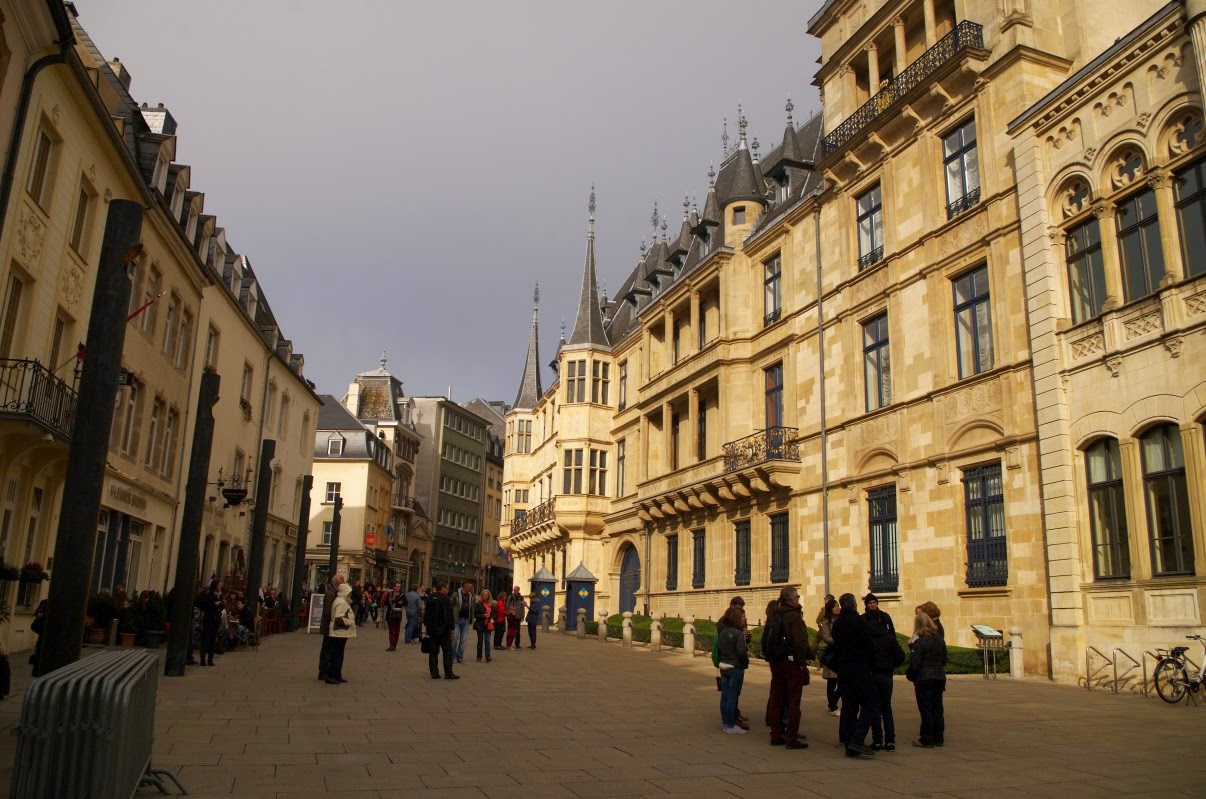 |
Grand Duchess Charlotte, who was also
second-cousin of my favourite Swedish
King, Gustav VI Adolf. |
The first count of Luxemburg was Sigefroy, or Siegfried, formerly of the Ardennes. According to the legend, he once visited the old Roman fort that was situated on the hill where Luxemburg is today, and found a beautiful girl among the ruins. She agreed to marry him, but she could never leave the cliffs, she said, and she had to be alone every Saturday. Sigefroy agreed, exchanged his land in Ettelbrück for the cliff over and the valley of the Alzette river, and settled down with the girl, Melusina, in a brand new castle.
Of course, he one day had to peek through the keyhole, to see what she was doing alone in her chamber on Saturdays, and what he saw horrified him: she was in her bath, and instead of legs, she had a fishtail! Turns out, pretty Melusina was a mermaid. When he had realized that, the spell was broken and Melusina disappeared into the Alzette river forever. Or not exactly forever; it is said that she returns every seven years in an attempt to find a new lover who can free her from the river.
Some say the old name of Sigefroy´s castle, "Lucilinburhuc", alludes to him having had to sell his soul to the devil (Lucifer) in order to get Melusina. I doubt that the current Grand Duke counts his lineage that far back (we are talking 900´s), but it would be kind of cool to claim a mermaid as one´s foremother, wouldn´t it?
 |
| The Grand-Ducal Palace to the right. |
The current Grand Duke is
Henri, and he is the grandson of the very popular and loved Grand Duchess
Charlotte, who has a very nice statue erected for her in the middle of the city. She was actually
elected head of state after her older sister, who had been ruling Luxemburg during the First World War, was forced to abdicate. The sister´s politics was not appreciated by her people (she supported the German occupation).
During the Second World War, Charlotte led an exile government in London, and remained loyal to her people, opposing the Germans (I also imagine this would have been easier for her than for her sister as Germany was no longer a kingdom but a republic, thus there being no royal kinships to consider). Her son
Jean, the next Grand Duke, took part in the Normandy landing, the battle of Caen and the liberation of Brussels, as a volunteer officer in the Irish Guards.
 |
This little girl decided to join the guards and march up
and down in front of the palace gate. |
We had a lovely day walking along the river, we and many others out for a holiday stroll. There was even a bit of sun! Really, this is a wonderful place for a little getaway, if you prefer holidaying in a city, but one that is not quite as buzzing as say, London or Paris.
It occured to me, as we were walking along the river, looking up at the city, that the Melusina legend is a wonderful allegory for that fragile balance of interdependence between a ruler/protector and his people, the knights in the castle and the folks below, living off the Alzette river. It is a small country, and I imagine a large part of the population is acquainted first hand with the royals. A tight and fond relationship, or so it seemed to me.
 |
| View over the Red Bridge, or Grand Duchess Charlotte´s Bridge. |
 |
There is an interesting mix of old architecture and some very modern, good
architecture that really looks wonderful. |
 |
| A bit of lëtzebuergesch: keep our city clean. |
 |
| Really, there is so little water in the Alzette that it´s quite hard to believe any mermaids still reside here. I suspect Melusina has moved on. |
 |
| We found a pub in precisely the right location to slake our thirsts. |
 |
A real fire, no less, and the mantlepiece says "Rest in Peace" -
we suspect it was made from a discarded gravestone... Fitting, though! |
 |
| This is the state of the Petrusse river - barely more than a ditch. |
 |
| This fancy building is often mistaken for the Grand-Ducal Palace, we were told. However, it is a bank. |



















It would be fun to claim a mermaid ancestor! I love the architectural mix.
ReplyDeleteIs the low water seasonal?
I have tried to find some information about it, but have only found scientific papers which are hard to get anything useful from. I would expect the river to be regulated in such a densly populated area. But in places it seems like there is a readiness to take more water at times, especially higher up in the Petrusse river valley, as you can see on the second picture from last. There has been a lot of flooding all across Europe in recent years, but I haven´t been paying much attention to whether Luxemburg has been particularly affected. Now that I have been there, I will keep an ear out.
DeleteI definitely want to return to Luxemburg - what a great place!